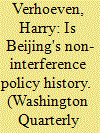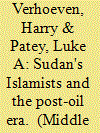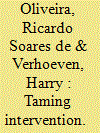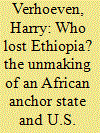|
|
|
Sort Order |
|
|
|
Items / Page
|
|
|
|
|
|
|
| Srl | Item |
| 1 |
ID:
147235


|
|
|
|
|
| Summary/Abstract |
ON 3 NOVEMBER 2015, UNDER THE WATCHFUL EYES of Saudi King Salman and Sudanese President Omar Al-Bashir, their respective finance ministers, Ibrahim Al-Assaf and Badredin Mahmoud, signed four agreements that committed the kingdom to funding three big dam projects in Sudan, as well as the cultivation and irrigation of more than a million acres near already-constructed dams on Sudanese territory.1 These framework accords were expanded upon when, in February 2016, Al-Assaf travelled to Khartoum to meet Mutaz Musa, Minister of Water Resources and Electricity and head of Sudan's hugely powerful Dam Implementation Unit. Ignoring the howls of anti-dam protesters assaulted by security forces, Al-Assaf committed US$5 billion in dam project finance to Sudan, which has struggled to revive economic growth following the secession of South Sudan in 2011 and the loss of three-quarters of its oil production. The multi-billion dollar promises are a quid pro quo for the participation of the Sudanese Armed Forces since March 2015 in the devastating war waged in Yemen against Houthi insurgents by King Salman and his 30-year-old Deputy Crown Prince, Mohammad.
|
|
|
|
|
|
|
|
|
|
|
|
|
|
|
|
| 2 |
ID:
136217


|
|
|
|
|
| Summary/Abstract |
This article argues that the securitisation of Africa’s environment and climate in the early twenty-first century has less to do with multidisciplinary inquiry into the complexities of climate change, development and conflict, and more with historically established paradigms of thinking about Africa, its ecosystems and notions of disorder and violence. Securitisation is the result of a specific moment in the post–Cold War era with its particular geopolitical configuration and of deeply embedded modes of imagining the African continent, its peoples and their relationship with the environments they inhabit. The main objective of this article is to historicise and politicise the prevailing dystopian discourse about climate-induced insecurity. I show that the assumptions and chains of causality that constitute today’s climate wars narrative are remarkably similar in nature to the environmental narratives that underpinned imperialist and post-independence discourses on environment and development, legitimising highly authoritarian interventions against local populations by governments.
|
|
|
|
|
|
|
|
|
|
|
|
|
|
|
|
| 3 |
ID:
162252


|
|
|
|
|
| Summary/Abstract |
The historical proximity between the Arabian Peninsula and the Horn of Africa has in recent years been increasingly experienced as a relationship of growing insecurity. Gulf States have rapidly expanded their economic and political roles on the other side of the Red Sea and have established military bases. This article argues that this interventionist thrust is historically rooted and deeply structural: the politics of state survival that dominate both the Gulf and the Horn are leading aspiring regional hegemons with a self-proclaimed responsibility to provide order to securitise their near abroad. Originating from the self-identity of regional powers and efforts to protect their respective domestic political settlements, this is producing a profoundly destabilising pattern of regional polarisation.
|
|
|
|
|
|
|
|
|
|
|
|
|
|
|
|
| 4 |
ID:
133160


|
|
|
|
|
| Publication |
2014.
|
| Summary/Abstract |
The rapid intensification of ties between the People's Republic of China (PRC) and Africa's 54 countries is of considerable geopolitical significance. It is impossible to understand how the PRC has sustained year-on-year breathtaking growth without factoring in the contribution of African commodity exports and the profits reaped by Chinese enterprises through African demand for consumer goods, construction projects, and information and communication technology services. An extensive literature analyses the China-Africa story: an initial shouting match pitted those who cast Beijing as leading the re-colonization of the continent1 against authors praising China as Africa's savior at a time when the West would only engage through the lens of the Global War on Terror and rock star-driven charity.2 In recent years, a more nuanced conversation has underscored historical dimensions to the China-Africa relationship, exploring change and continuity in Africa's place in the global political economy, and deconstructing the myth that all Chinese actors-such as PRC embassies, state-owned enterprises, private firms, and migrating individuals-share a unity of purpose, guided by a grand plan hatched by the Chinese Communist Party.3
|
|
|
|
|
|
|
|
|
|
|
|
|
|
|
|
| 5 |
ID:
184991


|
|
|
|
|
| Summary/Abstract |
In the last two decades, the rapid growth of many African economies has coincided with deepening commercial and political ties with China and a re-emergence of perilous indebtedness. US administrations have warned that Beijing is ensnarling Africa in debt to gain political leverage and force African states to cede strategic assets to China. The charge that China is uniquely responsible for Africa’s heavy debt is also shaping the flagship debt initiatives of the World Bank and the IMF. An analysis of the theoretical assumptions underpinning the ‘debt-trap’ narrative and the empirical evidence indicates that the preoccupation with China’s role is misguided, and is in fact rendering it harder to service and relieve African debt. Furthermore, framing the African debt problem in terms of great-power rivalry obscures structural features of the international financial system that are far more consequential in shaping the liquidity and solvency of African states.
|
|
|
|
|
|
|
|
|
|
|
|
|
|
|
|
| 6 |
ID:
122762


|
|
|
|
|
| Publication |
2013.
|
| Summary/Abstract |
Following the secession of South Sudan, Northern Sudan finds itself at a crossroads. Governed since 1989 by the Al-Ingaz regime, Khartoum's political elites are under pressure from the international community and the ordinary Sudanese people to democratise and ditch the autocratic Islamism that has been their hallmark for decades. Omar Al-Bashir and Ali Osman Taha face fierce criticism for presiding over the break-up of Africa's biggest country. Simultaneously, key constituencies in the security services and business community are signalling discontent too, lobbying instead for a further centralisation and the abandonment of the grudging liberalisation that started after Hassan Al-Turabi's removal from power in 1999-2000. Based on interviews with key movement and party members, this article assesses to what extent the Comprehensive Peace Agreement has changed the National Congress Party (NCP) and the Harakat Al-Islamiyya. It examines the internal dynamics within Khartoum's power bloc and argues that the current regime has in many ways become, 'Al-Ingaz without its Islamic soul', dixit one senior Islamist. Despite Bashir's controversial speech in Gedarif in December 2010, during which he called for Sharia and an end to multiculturalism in Northern Sudan, NCP ideologues are eyeing a strategic redeployment of political capital and economic investment, seeking to become an ordinary hegemonic party.
|
|
|
|
|
|
|
|
|
|
|
|
|
|
|
|
| 7 |
ID:
108339


|
|
|
| 8 |
ID:
193276


|
|
|
|
|
| Summary/Abstract |
Sudan has for decades been one of Africa's most fragmented polities. Yet arguably the single most consequential actor in its recent history is among the least well studied: the Sudan Armed Forces (SAF). For most of post-independence statehood, Khartoum has been ruled by generals. This article places SAF in a longitudinal context of the expansion and contraction of state power and the functions of the coercive apparatus in these processes. It situates SAF in institutional logics, driven by historically contingent ideas about the nature of the polity, the role of the army within it and its likely partners and enemies. Doing so historicises the strategic calculus of SAF during the 2018–2019 December Revolution which mobilised millions but ended with a new coup in October 2021. I underscore how institutionalised rivalry between SAF and other security services has moulded patterns of regime change and consolidation: from Ja'afar Nimeiri and Omar Al-Bashir to Abdelfatah Al-Burhan today, anxieties over security competition and state fragility shape SAF's willingness to break with regimes it once dominated and its subsequent subversion of revolutionary change and democratisation.
|
|
|
|
|
|
|
|
|
|
|
|
|
|
|
|
| 9 |
ID:
158013


|
|
|
|
|
| Summary/Abstract |
Military intervention in weak states by their more powerful peers is one of the great constants in the history of international relations, and is closely related to the question of state survival. In an anarchical international system characterised by a scarcity of resources, how do feeble polities manage threats to their sovereignty? African states in particular have been subject to continual interventions by outside forces, whether those of multilateral organisations such as NATO and the EU, or of individual great powers. This trend has only increased in the last two decades, owing, inter alia, to the ‘war on terror’, deepening worries over a nexus between security and migration, and the seemingly growing fragmentation of authority in numerous African states. The continent is the subject of two-thirds of UN Security Council discussions on armed conflict and the theatre of more ongoing UN peacekeeping operations than the remaining world regions combined. Yet it is striking that African states have not only maintained independent statehood and resisted regime change, but in recent years have both clamoured for extra-regional intervention and become avid inter-regional interveners themselves. A continent that might once have been described as the world’s most sovereigntist has thus, intriguingly, become highly tolerant, and even encouraging, of military intervention. Why?
|
|
|
|
|
|
|
|
|
|
|
|
|
|
|
|
| 10 |
ID:
188613


|
|
|
|
|
| Summary/Abstract |
In November 2020, Ethiopia descended into full-scale civil war which, owing to mass atrocities and regional intervention, metastasized into among the most acute humanitarian emergencies in the world. The violent fragmentation of state authority tarnished Ethiopia’s internationally sanctioned role as regional peacekeeper and developmental leader—an “anchor state” of the Pax Americana in the Horn of Africa. While acknowledging the complex, multi-dimensional origins of the conflict, this article examines how efforts by the U.S. government to reinvent the strategic relationship during the 2018–2020 political transition in Addis Ababa helped pave the road to war. We argue that U.S. policymakers provided largely unconditional support to Ethiopia’s new Prime Minister Abiy Ahmed, creating problems of moral hazard that encouraged confrontation between rival political forces. The story of U.S. engagement in Ethiopia in this period illustrates the perils of Washington’s efforts to rebalance fraught relations with its most important regional anchors.
|
|
|
|
|
|
|
|
|
|
|
|
|
|
|
|
|
|
|
|
|